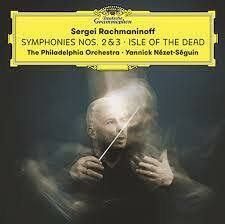New York, NY (Top40 Charts) Yannick Nézet-Séguin and The Philadelphia Orchestra present the second and final part of their survey of Rachmaninoff's symphonic works. Featuring three major compositions - the Second and Third Symphonies, and the symphonic poem Isle of the Dead - their album will be released by Deutsche Grammophon as part of the Rachmaninoff 150 celebrations. It follows on from the same artists' 2021 pairing of Symphony No. 1 and the
Symphonic Dances, which garnered widespread critical acclaim ("Nézet-Séguin conducts meticulous, pliant accounts, combining raw, brassy anguish … with velvety, poetic romanticism … Rhythms are taut, solos brilliantly coloured." The Guardian). Scheduled for release digitally and as a 2-CD set on 30 June 2023, the new album again draws on The Philadelphia Orchestra's peerless Rachmaninoff tradition, rooted in landmark performances and recordings with the composer himself.
Today's "Fabulous Philadelphians" and their
Music and Artistic
Director open their latest DG release with an impassioned reading of the monumental Second Symphony. The work was on the programme when the composer made his first appearance with The Philadelphia Orchestra, as both conductor and pianist, in November 1909. He had also conducted the symphony's world premiere in St Petersburg the previous year - a triumphant occasion. Nézet-Séguin's interpretation brings dynamic light and shade, as well as tonal warmth and richness, to a score imbued with heartfelt lyricism, quicksilver changes of mood, and constant reminders of Rachmaninoff's ability to spin memorable melodies from the tiniest of motifs.
The conductor and his musicians are on equally stunning form in the more compact Third Symphony, which received its world premiere performance in 1936 from The Philadelphia Orchestra and was recorded for the first time by them three years later, under Rachmaninoff's direction. The work's technical challenges, a tribute to the orchestra the composer knew and loved, are met in style here. The sense of mystery Nézet-Séguin and his players create with the muted opening draws the listener into the heart of this expressive work, full of both bright, ebullient orchestral colours and unsettling, darker hues, underpinned by Rachmaninoff's use of the medieval plainchant Dies irae motif - an enduring element of his musical language.
The album closes with Isle of the Dead, a symphonic poem inspired by the eponymous painting by the
Swiss symbolist artist Arnold Böcklin. His dreamlike scene shows a figure in a small boat, rowing towards a foreboding, desolate island. Rachmaninoff had seen a monochrome reproduction of this hugely popular work in Paris in 1907 and later said, "If I had seen the original first, I might not have composed my Isle of the Dead. I like the picture best in black and white." In 1909 he created this hugely atmospheric score, its associations with death heightened by plentiful quotations of the Dies irae motif. Nézet-Séguin and The Philadelphia Orchestra bring every detail of its vividly pictorial writing to life, from the dark waves, rising and falling, through the dramatic climaxes, to the gentle resignation of the ending, conjuring an image of the oarsman rowing away from the island, preparing to collect another dead soul as he continues his endless journey. For Yannick's upcoming tour dates, please visit yannicknezetseguin.com.
























